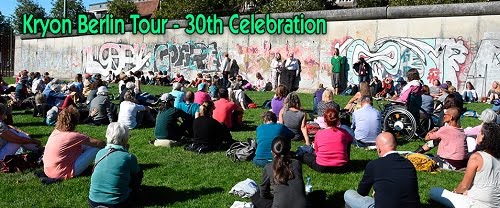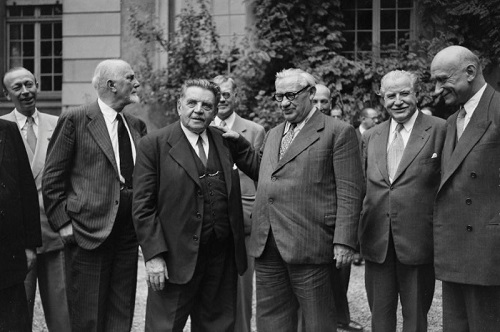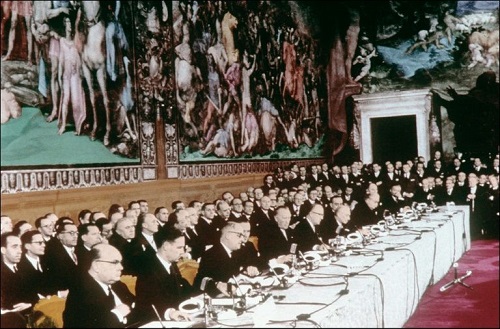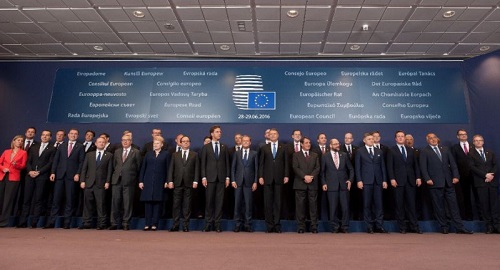For a long
time, Nelson Mandela was a controversial figure among German politicians, while
numerous German companies enjoyed good business relations with the Apartheid
government. It took a while for this to change.
"A huge personality," "a glowing example," "a person full of patience, love and tolerance" - these are some of the descriptions of Nelson Mandela appearing in the German press in the wake of his death. The former South African president is being celebrated as an icon of a peaceful struggle for freedom and politicians from all segments of the political spectrum are paying tribute to him and his achievements.
However, a
look back at the history of South African-German relations shows that public
admiration of Mandela in Germany has not always been the norm. Some politicians
of the past mistrusted Mandela.
Little
faith in Mandela's intentions
Until the
1980s, successive West German governments took a cautious approach to Mandela,
especially the conservative ones. Former foreign minister Hans-Dietrich Genscher
(Free Democratic Party) believes that some of these politicians have now been
forced to reconsider their former stance.
Genscher
himself advocated Mandela's release from prison to the United Nations in the
1980s - a move considered controversial in Germany. "I was accused of
supporting a murderer and terrorist," Genscher told DW.
The
categorization of Mandela as a "state terrorist" was also openly
accepted in the US and UK. "There is no doubt that the German government
could have and should have approached the inhuman Apartheid policy and the
thoughtless American and British stance in a far more critical fashion,"
commented Ludger Schadomsky, a DW Africa expert.
Anti-Apartheid attitude takes hold
 |
| Over time, the anti-Apartheid movement grew a following in Germany |
Anti-Apartheid attitude takes hold
At the same
time, the 1980s saw the rise of a strong anti-Apartheid movement. Products
imported from South Africa, such as wine and fruit, were suddenly being
boycotted by various church groups, civil organizations and school students.
And although the German government distanced itself from the Apartheid regime,
it did not at any point take part in the boycott initiative. According to Uschi
Eid, member of Germany's Green Party and vice-president of the German Africa
Foundation, some politicians at the time had no moral qualms about conducting
friendly relations with South Africa.
Germany
also had strong economic ties to South Africa. "Germany was South Africa's
most important trade partner - and South Africa was Germany's most important
trade partner in Africa," said Schadomsky. Even today, German carmaker
Volkswagen is a major employer in the country, while engineering and
electronics giant Siemens is an important investor. Nevertheless, due to public
pressure, many German companies pulled out of South Africa in the late 1980s,
moving their offices to countries like Zimbabwe.
Business
interests
According
to Michael Monnerjahn from the German-African Business Association, from
today's perspective all this can classify as double standards among
corporations. On public posters, German companies of the time denounced the
existing racial segregation - however, they did not employ black Africans as
managers.
German
business in South Africa was shaken up by the upheaval in the country in the
late 1980s. "Even if as a company manager you had a positive view of
Nelson Mandela back then, you still had doubts as to whether he'd be able to
restore social stability," said Monnerjahn.
 |
| Mandela had a powerful effect on German parliamentarians when he gave a speech in the Bundestag |
South
Africa's gradual opening and intention to end Apartheid following the change of
government in 1989 was unanimously welcomed by German politicians. This was the
time of "Pretoriastroika" - a play on the word
"Perestroika" used by Soviet politicians to refer to the
restructuring of the Soviet political and economic system after the fall of
communism. Mandela's negotiations with then-president Frederik Willem de Klerk,
conducted from Mandela's prison cell and with Mandela suffering a shoulder
bullet wound, had a large influence on the attitude change among German
politicians, according to Schadomsky.
However,
some skepticism was still present in Germany as late as 1996. This is when
President of the Bundestag Rita Süssmuth (from the Christian Democratic Union
party) invited Mandela, who had at this stage been South African president for
two years, to speak in front of the German parliament. "The opinion was
divided among certain politicians and members of parliament," Süssmuth
recalled later on in a radio interview. But in the end, Mandela was permitted
to make his speech, and "he stood there, his speech quiet but intense, and
he had an effect on our parliamentarians."
Reservations
and skepticism: today, these words in reference to Nelson Mandela seem like
relics of a different era. For a long time now, Madiba - as Mandela was called
in his home country - has been an immortal symbol of freedom and an icon for
German politicians. According to Schadomsky, Mandela managed to win over his
German skeptics with his charm.
Related Article:












No comments:
Post a Comment
Note: Only a member of this blog may post a comment.